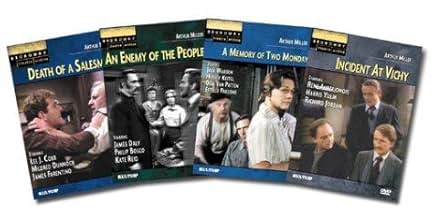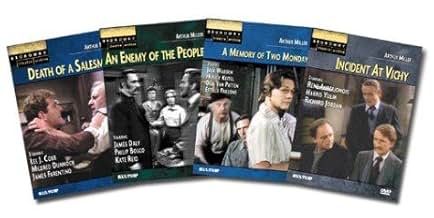A group of workers earn their livings in a Brooklyn automobile parts warehouse during the Great Depression. Most are filled with hopelessness; some are alcoholics. Kenneth, however, is a you... Read allA group of workers earn their livings in a Brooklyn automobile parts warehouse during the Great Depression. Most are filled with hopelessness; some are alcoholics. Kenneth, however, is a young man yearning for a college education.A group of workers earn their livings in a Brooklyn automobile parts warehouse during the Great Depression. Most are filled with hopelessness; some are alcoholics. Kenneth, however, is a young man yearning for a college education.
- Director
- Writer
- All cast & crew
- Production, box office & more at IMDbPro
Storyline
Did you know
- TriviaJack Warden, who appears in this production as GUS, was in the original Broadway production in 1955, appearing as MARCO.
- ConnectionsVersion of Erinnerung an zwei Montage (1966)
Featured review
In the movie ALL ABOUT EVE, when Eve Harrington springs her surprise to Addison De Witt that Lloyd Richards is going to leave his wife Karen and run off with Eve, De Witt quickly moves in for the kill against the conniving Eve that no other character in the film is able to do. But he quickly shows he is not impressed by her claims that she and Lloyd love each other. He reminds her, rather pointedly, that Lloyd Richards is the finest dramatist in America, and just the sort of person the ambitious Eve is looking for to write all her future material.
ALL ABOUT EVE came out in 1950, and there were actually three or four people who could have been the model for Lloyd Richards. The three that immediately crop up are Tennessee Williams, William Inge, and Arthur Miller. All three certainly wrote the finest plays of the 1940s and 1950s. And all three seemed to have a singular lack of success after 1960 - 1965 in writing successful plays again. In Inge's case he committed suicide. Williams and Miller would keep writing plays (usually with commercial failure facing them) until their respective deaths.
Miller's last successful Broadway play was AFTER THE FALL, his paean to his dead wife Marilyn Monroe, and his commentary of the blacklist. In subsequent decades he did come back a little (especially in the 1990s) but usually his success was greater in Great Britain's West End than on Broadway. Then, in 1974, one of his failed plays came out on television: A MEMORY OF TWO MONDAYS. It was well received, and had a first rate cast. It is a disjointed play (one can say it is really two plays slapped together, but that seems to be a bit unfair). But the story happened to deal with regular people, and was easy to enjoy.
Dan Hamilton is Kenneth (who is based on Miller as a young man). He is working during a summer in a warehouse, and he is recalling the various people who worked with him there. Among these people are Jack Warden (Gus), J.D. Cannon (Tom), Barnard Hughes (Jim), Kristoffer Tabori (Bert), Estelle Parsons (Agnes), Harvey Keitel (Jerry), and George Grizzard (Larry). Dan notes how these people change in the period that he worked with them - how they rose or fell due to changes in their lives. He also notes how his own passing among them left no real imprint after all.
For example, Warden's Gus is a loud, funny man, who is exuberant and full of life. He gets a rise from Agnes by his antics, and she complains about his washing habits. He looks at her and says, "And what is wrong...I'll tell you...I STINK!!!!" He starts almost dancing while he says this, roaring with laughter. But suddenly there is a phone call for him from his house. Gus is a romantic at heart, and his wife Lily (whom he seems to betray by running after woman) is actually the reason of his life. The phone call announces she has died suddenly. And it knocks the stuffing out of him. Subsequently (on the second Monday of the title, a few weeks later) we see that Gus has gone out with Barnard Hughes, his friend Jim. Hughes is trying to keep Warden's drinking down - he is trying to forget the loss of Lily. Gus has withdrawn all his money from the bank, and is spending it. He offers some to Kenneth and some of the others. He leaves followed closely by the soberer Jim. Later Jim returns to announce that Gus died from his carousing, and spent all his money before he died.
To balance this there is Cannon's Tom. He is a heavy drinker, and in the beginning he is drunk when the boss sees him. He's called into the office. When he comes out he looks quite grim, but far soberer. He announces that he has promised never to come in that way again. Everyone is joking about his promise, but then he does turn a new leaf. He is cold sober in the second half of the play - even when pouring drinks for some of the others during a mild celebration. But what is worse, he turns into an obnoxious prig. Basically he insists that if he could do it, so can they!
Tabori's Bert seems an easy going talented type, but as the play continues he seems to be caught up in the problems of making a living rather than spending time day dreaming about his future with Kenneth (they even discuss books at the start, but not at the end). And in the end, Kenneth is leaving for his future - a richer one involving writing and intellectual pursuits. And the people who have been involved in his life all that summer barely really note his leaving them.
The play worked quite well, and probably could be revived (along with that other late play, THE PROMISE). I wish they would show it again, especially as two of the performers I have mentioned (Warden and Hughes) died in the last month. Both were excellent on stage (I saw Hughes as Dogberry years ago), on television, or in film. I hope by discussing A MEMORY OF TWO MONDAYS here to honor their memory a little for what entertainment they both gave the American public.
ALL ABOUT EVE came out in 1950, and there were actually three or four people who could have been the model for Lloyd Richards. The three that immediately crop up are Tennessee Williams, William Inge, and Arthur Miller. All three certainly wrote the finest plays of the 1940s and 1950s. And all three seemed to have a singular lack of success after 1960 - 1965 in writing successful plays again. In Inge's case he committed suicide. Williams and Miller would keep writing plays (usually with commercial failure facing them) until their respective deaths.
Miller's last successful Broadway play was AFTER THE FALL, his paean to his dead wife Marilyn Monroe, and his commentary of the blacklist. In subsequent decades he did come back a little (especially in the 1990s) but usually his success was greater in Great Britain's West End than on Broadway. Then, in 1974, one of his failed plays came out on television: A MEMORY OF TWO MONDAYS. It was well received, and had a first rate cast. It is a disjointed play (one can say it is really two plays slapped together, but that seems to be a bit unfair). But the story happened to deal with regular people, and was easy to enjoy.
Dan Hamilton is Kenneth (who is based on Miller as a young man). He is working during a summer in a warehouse, and he is recalling the various people who worked with him there. Among these people are Jack Warden (Gus), J.D. Cannon (Tom), Barnard Hughes (Jim), Kristoffer Tabori (Bert), Estelle Parsons (Agnes), Harvey Keitel (Jerry), and George Grizzard (Larry). Dan notes how these people change in the period that he worked with them - how they rose or fell due to changes in their lives. He also notes how his own passing among them left no real imprint after all.
For example, Warden's Gus is a loud, funny man, who is exuberant and full of life. He gets a rise from Agnes by his antics, and she complains about his washing habits. He looks at her and says, "And what is wrong...I'll tell you...I STINK!!!!" He starts almost dancing while he says this, roaring with laughter. But suddenly there is a phone call for him from his house. Gus is a romantic at heart, and his wife Lily (whom he seems to betray by running after woman) is actually the reason of his life. The phone call announces she has died suddenly. And it knocks the stuffing out of him. Subsequently (on the second Monday of the title, a few weeks later) we see that Gus has gone out with Barnard Hughes, his friend Jim. Hughes is trying to keep Warden's drinking down - he is trying to forget the loss of Lily. Gus has withdrawn all his money from the bank, and is spending it. He offers some to Kenneth and some of the others. He leaves followed closely by the soberer Jim. Later Jim returns to announce that Gus died from his carousing, and spent all his money before he died.
To balance this there is Cannon's Tom. He is a heavy drinker, and in the beginning he is drunk when the boss sees him. He's called into the office. When he comes out he looks quite grim, but far soberer. He announces that he has promised never to come in that way again. Everyone is joking about his promise, but then he does turn a new leaf. He is cold sober in the second half of the play - even when pouring drinks for some of the others during a mild celebration. But what is worse, he turns into an obnoxious prig. Basically he insists that if he could do it, so can they!
Tabori's Bert seems an easy going talented type, but as the play continues he seems to be caught up in the problems of making a living rather than spending time day dreaming about his future with Kenneth (they even discuss books at the start, but not at the end). And in the end, Kenneth is leaving for his future - a richer one involving writing and intellectual pursuits. And the people who have been involved in his life all that summer barely really note his leaving them.
The play worked quite well, and probably could be revived (along with that other late play, THE PROMISE). I wish they would show it again, especially as two of the performers I have mentioned (Warden and Hughes) died in the last month. Both were excellent on stage (I saw Hughes as Dogberry years ago), on television, or in film. I hope by discussing A MEMORY OF TWO MONDAYS here to honor their memory a little for what entertainment they both gave the American public.
- theowinthrop
- Jul 25, 2006
- Permalink
Details
Contribute to this page
Suggest an edit or add missing content





















